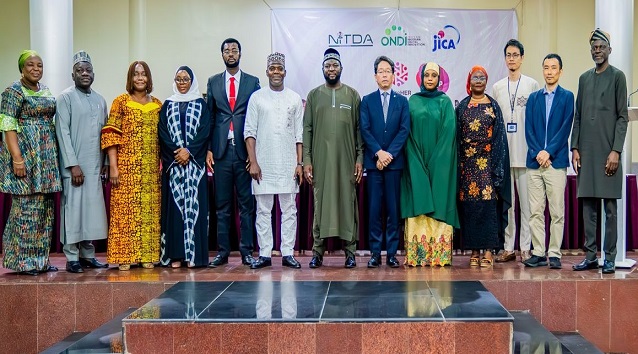General News
Middle East Energy Targets over 170 Countries for its 48th Edition Centred on Global Energy Transition

Middle East Energy, the leading energy industry event in the MEA region, will be making its anticipated return to Dubai World Trade Centre on 7 – 9 March 2023 to guide energy transition conversations across the globe.

Organised by Informa Markets, the leading global exhibitions organiser, it is set to bring together buyers and sellers from across different countries to explore the latest advancements in energy products and solutions.
The 48th edition will provide opportunities to network with international energy suppliers, discover products and solutions that are changing the energy landscape, and build long-lasting business relationships.
Ade Yesufu, Exhibition Manager, Middle East Energy, said, “Over the years, Middle East Energy has supported the global energy community to find solutions that empower the rapid acceleration of electricity consumption across the Middle East and other parts of the world.
This year, the aim is to advance the conversations in light of the current global reality and changes in the energy industry.
This event also brings together the highest level of decision-makers and international partners to connect and discover innovative products and solutions that can deliver cleaner energy and supply sustainable power.”
With over 800 exhibiting companies representing 170 countries and a 20,000+ global audience, participants will explore insights on the future of alternative energy solutions that will help in delivering more efficient and effective power systems.
This edition of Middle East Energy will focus on five key product sections that are leading the way in the energy transition: Smart Solutions, Renewable & Clean Energy, Backup Generators & Critical Power, Transmission & Distribution, and Energy Consumption & Management.
Middle East Energy will also feature strategic conferences and content arenas focusing on the latest technologies and products to provide a platform for knowledge sharing, support relationship building, and uncover solutions to some of the most pressing challenges posed by the energy transition.
These include CEO roundtables, technical sessions, and the Intersolar Conference which will bring together global policymakers, utilities, developers, financiers, and technology leaders across three days to create the blueprint for a successful energy transition across the Middle East and Africa.
Confirmed panellists include:
- Licypriya Kangujam, a 11-year-old climate activist.
- Raphael Mworia, Commercial Director, KETRACO – Kenya Electricity Transmission Company Ltd
- Abraham Serem, Acting Managing Director & Chief Executive Officer, KenGen – Kenya Electricity Generating Company
- Abdulaziz Al Naim, CEO, Saudi Power Company
- Dr Joseph Oketch, Director – Electricity and Renewable Energy, Energy & Petroleum Regulatory Authority, Kenya
- HE Mrs Leila Benali, Minister of Energy Transition and Sustainable Development, Kingdom of Morocco
- Azhar Hussain, Principal Investment Officer, International Finance Corporation
Other conferences include The Technical Seminar, an interactive forum for the world’s leading energy experts and technical minds to discuss and explore the innovations and technologies driving the energy transition and Intersolar Middle East, a gathering of solar and renewable energy industry professionals in the MEA region to discuss the transformative dynamics of renewable energies around the world.
The event is supported by numerous trade associations, governmental agencies, and industry partners such as Alfanar as the Diamond sponsor; Baudouin and Riyadh Cables Group as Platinum sponsors; Ducab, LTC Group, and Bahra Electric as Gold sponsors; Riello UPS as a Silver sponsor and Eaton as Technology Partner.
General News
Kuwait Busts Nigerian Cybercrime Ring Targeting Telecom Tower, Banks

Kuwait’s Criminal Security Sector has dismantled an international cybercrime ring composed of Nigerians responsible for coordinated attacks on telecommunications towers and banks, the Ministry of Interior announced on Sunday.

According to Arabic-language daily Al Qabas, the case was initiated after the Communication and Information Technology Regulatory Authority reported cyber intrusions targeting local telecom networks.
Specialised security teams quickly launched an investigation, discovering that the suspects used advanced electronic devices to breach networks and distribute mass phishing messages impersonating banks, aiming to steal account information and siphon funds.
Signal-tracking technology led investigators to a vehicle in the Salmiya area.
When authorities attempted to stop the vehicle, the driver tried to flee, colliding with several cars before being apprehended following a fierce struggle.
A search of the vehicle uncovered sophisticated electronic equipment and various technical tools.
Upon investigation, the suspect confessed to collaborating with an accomplice to hack telecom networks and send fraudulent messages posing as banks and telecommunications companies.
Police subsequently located and arrested the second suspect, and a search of their residence uncovered additional devices used to analyse the stolen data.
Both suspects, along with the seized equipment, have been handed over to the relevant authorities for prosecution.
The Ministry of Interior reaffirmed its commitment to protecting the nation’s cybersecurity and intensifying efforts to combat electronic fraud targeting both citizens and residents.
General News
Nigerian Scientists Await Return of Egusi Seeds Sent to Space

Space in Africa, the Lagos-based firm Oniosun founded, is expecting its Egusi melon seeds to splash down in the Pacific Ocean Saturday—fresh from a trip to the International Space Station.

Once Earthside, experiments will begin on what is being hailed as the first food native to West Africa to be sent to space.
As Oniosun told AFP on Friday, it could herald an era where space exploration reflects the planet’s diversity.
“When we talk about humans colonizing other planets, this is not just an American mission or a European mission—this is a global mission,” he told AFP.
And future African space explorers might enjoy a taste of home.
Experiments on extraterrestrial food, which is to say tested in space, have been going on for years.
Growing food in space is seen as a crucial part of long-distance space flight and long-term missions, where frequent resupply won’t be feasible.
Scientists at the University of Florida in the United States, and the International Institute of Tropical Agriculture, in the southwestern Nigerian city of Ibadan, will examine the seeds “to see the effects of exposure to space” and zero gravity, including on the seeds’ DNA.
Once planted, researchers will monitor their post-space performance and germination.
The seeds went up to the ISS on a SpaceX flight last week, as part of NASA’s partnership with private firms.
Oniosun said the inclusion of Egusi seeds marked an important step forward, both for those on Earth as well as future astronauts.
High in protein, they are typically used to prepare soups and stews across West and Central Africa.
Africa’s most populous country has a small space industry, but the launch of the seeds seemed to generate more excitement on social media and in newspapers than previous launches of Nigerian satellites, he said.
“The moment that we’re sending food that they love, a food that holds significant cultural contexts to Nigeria… everybody starts getting interested in the subject,” Oniosun told AFP.
“The launch of Egusi melon seeds into space is more than a symbolic gesture,” he added.
“The future of humanity among the stars must reflect the diversity and richness of life on Earth.”
Whether pounded yam—the key dish served alongside Egusi soup—will make its way to the final frontier remains to be seen.
General News
NITDA Deepens Digital Gender Inclusion with IgniteHer Bootcamp

In a powerful demonstration of its commitment to the Renewed Hope Agenda of the present administration of President Bola Ahmed Tinubu GCFR, the National Information Technology Development Agency (NITDA) has launched the second cohort of the IgniteHer Bootcamp for Women Entrepreneurs, a strategic initiative aimed at accelerating gender inclusion and economic empowerment through digital innovation.

The bootcamp, themed “Empowering Women Entrepreneurs for Growth and Innovation”, was launched in partnership with the Japan International Cooperation Agency (JICA) and brought together selected women entrepreneurs from across Nigeria, both physically and virtually, for rigorous training in digital skills, innovation management, business development, and investor readiness.
The NITDA Director General, Kashifu Inuwa CCIE, who declared the bootcamp open, reaffirmed the Agency’s role in aligning Nigeria’s digital development with the national priorities of reforming the economy for sustained inclusive growth and accelerating economic diversification through industrialisation and digitisation.
“Through IgniteHer, we are actualising President Bola Ahmed Tinubu’s Renewed Hope Agenda by expanding women’s access to technology and economic opportunity,” he stated.
The DG, who was represented by the agency’s Acting Director of the Digital Literacy and Capacity Building department, Dr. Ahmed Tambuwal, noted that inclusive innovation is a cornerstone of NITDA’s Strategic Roadmap and Action Plan (SRAP 2.0: 2024–2027), which supports national aspirations for inclusive growth, poverty eradication, and youth empowerment.
“We are not merely imparting skills; we are creating self-reliant entrepreneurs, change-makers, and leaders,” he added.
Inuwa disclosed that the IgniteHer Bootcamp is also a key component of the National Gender Digital Inclusion Strategy (NGDIS), through which NITDA is working to empower 12.7 million Nigerian women with digital literacy skills by 2027. He averred that the programme complements broader government efforts to bridge gender gaps, enhance productivity, and reduce unemployment, especially among young women.
Citing a report by the World Wide Web Foundation, the DG emphasised that closing the digital gender gap in Nigeria could unlock an estimated $13 billion in GDP growth over the next decade.
“This training is a step towards harnessing this economic potential and ensuring that women play an integral role in shaping the digital landscape of Nigeria,” he noted.
He therefore called on participants selected from over 12,000 applicants to seize the moment and shape the future of Nigerian entrepreneurship.
While highlighting NITDA’s leadership in strategic partnerships, the DG commended JICA and the Government of Japan for their ongoing collaboration in supporting digital empowerment through programmes like IgniteHer and the iHatch Incubation Programme, which provides startup support, mentorship, and innovation development to early-stage entrepreneurs.
“At NITDA, we believe that inclusive innovation is not just an ideal but a critical strategy that ensures the growth of a stronger economy, the development of smarter solutions, and the existence of more resilient communities. Through IgniteHer, we are dismantling barriers and replacing them with pathways to opportunity,” he concluded.
In his remarks, the Japanese Ambassador to Nigeria, Matsunaga Kazuyoshi, reaffirmed Japan’s long-standing commitment to innovation and gender inclusion in Nigeria. He announced that Japan, through JICA, is currently supporting two grant projects worth $30.9 million, focused on improving Nigeria’s startup ecosystem, strengthening the investment climate, and building an inclusive innovation hub.
The Ambassador also referenced the upcoming Tokyo International Conference on African Development (TICAD 9), themed “Co-create Innovative Solutions with Africa”, as further testament to Japan’s dedication to deepening Africa-Japan cooperation on digital transformation and entrepreneurship.
Lead Facilitator of IgniteHer, Hajiya Hafsat Salabi-Dange, described the programme as a catalyst for social and economic transformation. While praising NITDA’s visionary approach to development, she stated that the programme is a movement that is bridging the digital gender divide and fostering economic independence.
Encouraging the participants to remain curious, intentional, and bold, she said, “What you will gain here goes beyond business; it is a tool for community upliftment, national growth, and generational impact.”

 Telecom3 days ago
Telecom3 days agoMTN’s mPulse Spelling Bee Returns with Regional Competitions and ₦40M in Prizes

 Telecom3 days ago
Telecom3 days agoMTN Nigeria Launches Cloud Accelerator to Power Africa’s Startup Future

 E-Business3 days ago
E-Business3 days agoArtificial Intelligence: The Indispensable Catalyst for Nigeria’s Agricultural Revolution

 Telecom3 days ago
Telecom3 days ago9mobile Rebrands as T2, Vows to Shake Up Telecom Sector

 Broadcasting3 days ago
Broadcasting3 days agoAmaarae Crowned Spotify’s EQUAL Africa Artist for August

 Telecom3 days ago
Telecom3 days agoNigeria Mulls Trust Fund to Preserve Telecom Infrastructure

 General News3 days ago
General News3 days agoNigerian Scientists Await Return of Egusi Seeds Sent to Space

 News21 hours ago
News21 hours agoGoogle Hit by AI-driven Cyber Attack























